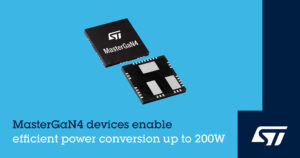 The STMicroelectronics MasterGaN4* power packages integrate two symmetrical 650V gallium-nitride (GaN) power transistors with 225mΩ RDS(on), alongside optimized gate drivers and circuit protection to simplify the design of high-efficiency, power-conversion applications up to 200W.
The STMicroelectronics MasterGaN4* power packages integrate two symmetrical 650V gallium-nitride (GaN) power transistors with 225mΩ RDS(on), alongside optimized gate drivers and circuit protection to simplify the design of high-efficiency, power-conversion applications up to 200W.
The latest addition to ST’s MasterGaN family, MasterGaN4 simplifies design using wide-bandgap GaN power semiconductors by taking away the complex gate-control and circuit-layout challenges. With inputs tolerant of voltages from 3.3V to 15V, MasterGaN4 can be controlled by connecting the packages directly to Hall-effect sensors or a CMOS device such as a microcontroller, DSP, or FPGA.
Leveraging the higher operating frequencies enabled by the superior switching performance of GaN transistors, as well as their increased efficiency that reduces thermal dissipation, designers can choose small magnetic components and heatsinks to build more compact and lightweight power supplies, chargers, and adapters.
MasterGaN4 is ideally suited to use in symmetrical half-bridge topologies as well as soft-switching topologies such as active clamp flyback and active clamp forward.
The wide supply-voltage range, from 4.75V to 9.5V, allows convenient connection to an existing power rail. Built-in protection further simplifies design, including gate-driver interlocks, low-side and high-side under-voltage lockout (UVLO), and over-temperature protection. There is also a dedicated shutdown pin.
As part of the launch, ST is also introducing a dedicated prototype board (EVALMASTERGAN4) that provides a complete set of features to drive the MasterGaN4 with a single or complementary driving signal. An adjustable deadtime generator is also provided. The board gives users the flexibility to apply a separate input signal or PWM signal, insert an external bootstrap diode, separate the logic and gate-driver supply rails, and to use a low-side shunt resistor for peak-current-mode topologies.
Filed Under: Components, News


Questions related to this article?
👉Ask and discuss on EDAboard.com and Electro-Tech-Online.com forums.
Tell Us What You Think!!
You must be logged in to post a comment.